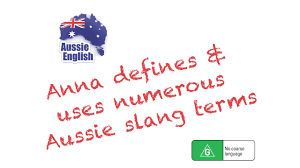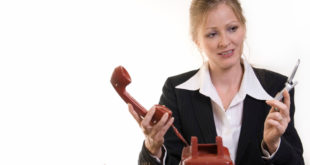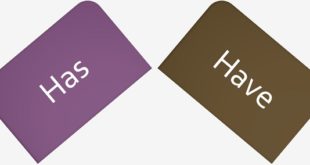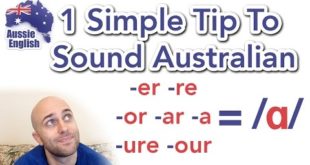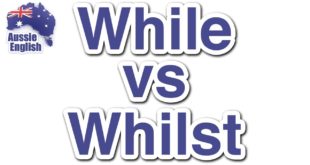Welcome to this episode of Aussie English, guys. It’s an impromptu one. I’m sitting here with my new housemate Anna. She’s in her pyjamas ready to go to bed, but I have convinced her to record this impromptu episode where I’m going to give her random Aussie slang words to define and then use in an example sentence.
Oh god. This could test me.
Oh man, you’re going to be fine. You’re going to be fine.
Alright.
“Ace”, what does “Ace” mean and how would you use it?
Yeah, I probably wouldn’t use “Ace”, I’d use “Aces”. So, I’d say, “Man that’s aces” as in that’s great, it’s excellent, I’m really enjoying it, it’s “aces”.
“Arvo”.
“Arvo”, “This arvo I went for a walk.” “Arvo”’s like an abbreviation of “Afternoon”.
“Cactus”.
“Cactus”. Oh, if I’m “Cactus”, I’m cooked, I’m tired, I’m beat, I’m possibly a little drunk.
“Chockas”, “Chocka” or “Chockablock”.
Yeah, “Chockas” or “Chockablock”. I’m “Chockablock” from that kit-kat that I just had. I’m full, I’ve eaten a lot.
“Not within a cooee”.
“Not within a cooee”…
I don’t think that’s one I’d ever use but I know what it means.
Yeah, I don’t think I’d ever use it in a sentence, but “Cooee” is like when you go “Cooee!”.
And why would you do that?
‘Cause you’re trying to find people near you. So, if you’re “Not within a cooee” you’re far away from it.
And where would you… but where would you use that?
Oh, bushwalking.
Yeah, so you’d be out in the bush, in the sticks.
Yeah, and you’re lost, you’re lost. You get taught it as a kid, right, is that if you ever get lost you’re meant to like “Cooee” and hopefully someone will come and find you.
‘Cause it’s like a scream, but it’s not. Like, it’s meant to be a sound that you make to let someone know where you are without it being that you’re in danger.
Immediate danger yeah.
Alright, what else? “Mad as a cut snake”.
I also never use this, but “Mad as a cut snake”, “Oh, that lady down the shops was mad as a cut snake” means she was a bit crazy, she was pretty angry, just maybe a bit nuts really.
And what’s the basic idea there, if you were to literally talk about…
Oh, ok, if you were thinking about… if you cut a snake it goes… it would go wild, like, it would sort of move around a lot, get pretty… it’d be pretty unhappy.
Just to put it mildly.
Yeah.
Alright. What’s “A docket”.
“A docket”? As in a receipt?
Yeah.
Yeah, oh ok. Yeah, if it’s “A docket” it’s just a receipt. So, you get “A docket” with your groceries or with your petrol or whatever.
It’s an Australian term.
Really?
Yeah, I didn’t realise either.
Yeah, ok!
Alright, “Fair dinkum”.
“Fair dinkum”, again, I would never use this, but if it’s “Fair dinkum”, it’s sort of pretty versatile that one. So you could say, “She’s fair dinkum”, she’s, like, legitimate, she’s good, she’s a good person. You could say, “It’s fair dinkum”, it’s the real deal.
You can also use it in kind of a response, right, if someone tells you a fact and you’re sort of half disbelieving or it’s sort of “Oh really?!”.
Or you could even be like, “Oh, fair dinkum?”, like, yeah, I agree, kind of, like…
That’s funny isn’t it. I didn’t… yeah it’s pretty versatile.
Yeah.
“Fair go”.
“Fair go”. This is such a, like, a thing that Australians claim that “Oh, us Aussies we all have to have a fair go”, but I just think it’s… anyway. So, “Fair go”, it’s basically, it’s literal meaning is everyone’s allowed a fair chance at something, and it’s something that Australians like to think is unique to us.
What about “Going off”?
“Going off”? This you can use a lot. So, if I was “Going off” at Pete ’cause he left his dishes out, I was getting mad at Pete.
So, it can mean getting angry, getting mad.
If there’s a party “Going off” it’s like the party going off is like… it’s good, it’s a great party, I don’t know how to…
It’s very exciting, it’s like “wild”.
Yeah, and then, oh “Going off” as in “food going off”, as well. I don’t know if that’s an Australian thing or not, but if like food’s going bad, if it’s old or it’s getting moldy, food can “go off” as well.
There’s quite a few for this one.
And then you could “go off” somewhere.
Yeah, true, yeah.
And I think like the party example you could say, if you go to the beach, you’re ready to go surfing, you could say, “Oh man, the surf’s going off!”, which means it’s really good, the surf’s amazing.
“Grouse”.
“Grouse”. So many of these I can just imagine my very Australian friends saying. “Grouse”? I don’t really know, like, it’s sort of like, it’s like, “Oh that’s grouse!”, like, that’s great, that’s interesting. I don’t really… I mean, how would you use it?
That’s how they defined it here. They say, great, terrific. It’s “Grouse”, that’s “Grouse”. it’s more just a synonym for good or great. That’s really good, it’s “Grouse”. You’ll hear it, very very Australian Australians say that kind of term. “Oh man it’s grouse!”.
What about “Good onya”? Would you ever use “Good onya”?
Yeah, I would but probably more sarcastically like, “Oh good onya, mate!” would be how I would use it, as in like “Oh…
Good job!
yeah, righto, like, whatever!”. But I think, like, if you’re using it not sarcastically…
In an encouraging kind of way.
Yeah, like “Good onya, mate!”, like, “Good on you!”, like, “Good on you” for giving it a go or like doing whatever it was that you did.
Alright. “To have a few kangaroos loose in the top paddock”.
I have no idea.
You don’t know what that one means?
Crazy?
Yep.
Oh, ok! No… I don’t think I’ve ever heard that one.
It’s defined here as, “Intellectually inadequate.”
“Intellectually inadequate”, I mean that’s a very clinical definition.
So, it’s like to have a screw loose, “To have a few kangaroos loose in the top paddock”, as in your head, your brain, in the top paddock.
Oh, ok, alright.
“To kick the bucket”.
“Kick the bucket” is to die, or… like you could use “Kick the bucket” like “Cark it”.
Or to be “Cactus”.
Yeah.
And there’s one, “Cark it”, that’s pretty Australian.
Yeah.
That means to die.
“To cark it” is to die, yeah. And that doesn’t have to be a person, it could be like your car “has carked it”.
“Knock back”, “To knock back someone” or “To knock back something”.
Knock…Oh… Yeah, so “Knock back someone” is to like almost reject them, like, to say no. And “To knock back something”, like, you’d “Knock back” a drink.
And that just means to finish it?
You’d drink it, yeah.
What else can we do? If something’s “A piece of piss”, “A piece of piss”.
I don’t know. I don’t use that.
You don’t use that? You’ve never heard it?
“A piss of piece”, “A piss” as in urine, obviously, it means if something’s easy.
Oh, man, “Piss of piece”.
Like “A piece of cake”?
Yeah, exactly, exactly. It’s like “Piece of cake” except it’s something I would hear…
“Piece of piss”, but we’ve made it worse.
Exactly. “Oh man, it’s a piece of piss”.
So, that’s probably the kind of thing to be aware of but maybe avoid using.
Yeah, like, that’s one of those ones that I don’t know… “Piece of cake” just sounds nice.
Yeah, that’s one to use in a formal situation. “Piece of piss” will probably get a lot of people laughing, though, especially if you’re a foreigner with an accent…
Yeah, exactly.
…they’d be like, “What?! Where’d you learn that?!”.
What about, “No worries”?
Oh, “No worries”, I use that so much. Everyone uses that so much. “No worries” is like, don’t worry about it, it’s all good, like, you say it in response to pretty much anything, like if someone says thank you to you, you say “Oh, no worries, like, too easy”.
As in like, “You’re welcome”.
Yeah.
And then if someone was to, like, ask you to do something you could be like, “Oh, of course, no worries”.
Yeah, “No worries, mate”, yeah.
That’s a funny one. I didn’t realise just how much that one was Australia, because obviously seeing it all from the inside as I am an Australian…
You don’t notice, yeah.
…yeah, all these things are just, “Well that’s English”, but you don’t realise when Americans or British people come over and you say that kind of, not necessarily, “No worries”, but other things they’ll be like, “What?”.
Yeah. Yeah, but like, it’s like, one I noticed as well is that we always say, “Have a good one”, like, no one knows what “The one” is, but like…
“Day”, “The day”, “Have a good day”, “Have a good one”.
Yeah, “Have a good one”, oh yep, yep, cheers, “Have a good one!”.
Alright, what about… oh, what was the other one I was just thinking of? “I reckon” or “Reckon”, that’s a very Australian thing too.
Oh, yeah, “I reckon”, “I think”, basically.
Yep, so it’s sort of like “I find”, “I think”, “My opinion is…”, “I reckon”.
Yeah, but you can use it… yeah, and you can use it like sort of like… whereas “I think” you would use mostly at the beginning of a sentence, you can, like, use it, like, it comes a lot at the end of the sentence as well, like.
Yep. Give me an example.
I don’t know.
You got this.
Like, if someone asked me… I don’t know why this example’s popped in my head, but if someone asked me how many sheep were over there I’d say, “Oh, 50 I reckon.”. Yeah.
Yep. And if you agree with someone too, right, like if someone said, “Man, it’s so hot today!”. How would you reply to that? Could you say…
“Yeah, I reckon.”
Yep.
Alright, here we go. “Ridgy-didge”.
“Ridgy-didge”? What? I assume it has something to do with a didgeridoo, but like…
I think it’s just like… I have no idea where this one comes from, but “Ridgy-didge” apparently means, “Original” or “Genuine”. So, I think, it’s one of those ones I have heard…
Oh, as in like “You’re ridgy-didge.”?
Yes. It’s like “Fair dinkum”. “He’s fair dinkum, he’s ridgy-didge”.
That’s a pretty random one.
That is so… yeah, I haven’t heard that one.
“Rack off”.
Oh, “Rack off!” is like “Go away”, but it’s a bit more forceful.
Slightly ruder. It’s a bit like “Nick off!”.
Yeah, and it’s not something that you would say in polite company. You could never tell anyone to “Rack off” in a polite way. It would be like you were yelling at someone, from the front…
Without dropping “F-bombs” and saying “‘F’ off!”.
Yeah, all I’m picturing is some kind of disgruntled old person standing in their front yard yelling at the youths to “Rack off”.
“Rack off kids! Rack off my lawn! Rack off!”.
“Sparrow’s fart”.
Little…?
“Sparrow’s fart”.
I don’t know.
“Dawn”.
Is it really?
Yeah, so if you get up at “Sparrow’s fart”, it’s like the sparrow, the bird, has just woken up and farted. It’s the morning. “Sparrow’s fart”.
I think I’ve heard it but I never knew what it meant.
“Ripper”.
Oh, if it’s “A ripper” it’s… again, it’s like “A good one”. We have a lot of words for that…
Yeah, “Ripper”, “Beauty”.
Yeah.
It just means, “Great”, “Good”. She’s… “Oh man, it’s a ripper. That was a ripper”.
Especially when you’re talking about, like, waves or something. That’s what comes to mind.
What else can we do? “To root” or “Rooted”. This one’s going to be useful especially if you’re an American listening, ’cause they often get this the wrong way around, or they say…
What do they say?
They say “To root” as in to barrack for a team, to support a team. “Yeah, we’ll be rootin’ for ya!”.
No…!
And you’ll be like, “Excuse me?”, because what does it mean in Australian English?
“To root” means “To have sex” in Australian English.
So, if you have “A root”…
It’s very different from supporting a sports team.
…or you root someone. Yeah, it means to have a shag or to have sex with someone. But if you’re “Rooted”, what does that mean?
“Tired”.
Yep. So, it’s sort of like saying, “I’m F’ed”. If you were to drop the F-bomb, without me swearing, that’s a very very extreme example of saying, “Oh, I’m rooted”. That’s a little more polite. You could say that in semi-formal company. “Oh, man, I’m so rooted”, which is probably where you’re at at the moment, wanting to go to bed.
Alright, we’ll do one last one. “To hit the turps”, “Hit the turps”.
“Hit the turps”? I don’t know.
Yeah. “To hit the turps”.
As in, turpentine?
Yeah.
No. I don’t know.
“To hit the turps.”
What is it?
So, if you went out and you “Hit the piss” what does that mean?
You go out drinking. You get drunk.
Yep, “To hit the turps” is the same thing.
Oh really?
Yeah. That’s grim.
Well, that’s it. If you were to actually drink turpentine you would not have a good time.
No, you would very much not be enjoying yourself.
You might be drunk before you die.
Yeah.
But, “To hit the turps”.
It might be a painful way to go.
Yeah, I always hear that. It’s like to go binge drinking, to really drink a lot, “Let’s go hit the turps”.
Which is something that’s big in Australian culture.
Alright. Cool. Thanks Anna!
Nah, thanks for having me.
Hopefully, everyone got a lot of info out of this episode, and I expect to hear you guys using this, or see you guys using this on the Facebook page.
Yeah. Give it a go! I clearly don’t use enough of it.
See ya guys!
See ya!
 ایرانیان استرالیا Australia Iran بزرگترین جامعه ایرانیان ساکن استرالیا Australia Iran
ایرانیان استرالیا Australia Iran بزرگترین جامعه ایرانیان ساکن استرالیا Australia Iran

